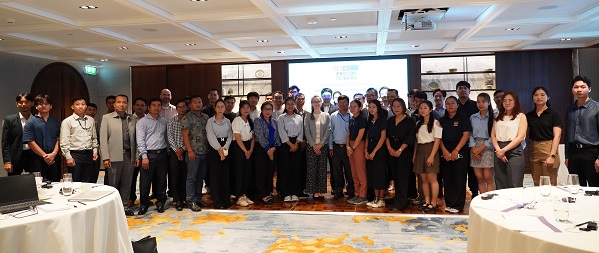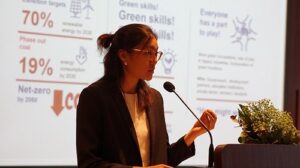Weaving Sustainability into Cambodia’s Garment Industry
The Green Growth Pilot Initiative
As global brands increasingly prioritize sustainable sourcing strategies, Cambodian garment manufacturers face the challenge of meeting stringent environmental requirements to secure international contracts. The Green Growth Pilot initiative addresses this challenge head-on.
About the Green Growth Pilot
Cambodia’s garment industry is a cornerstone of the country’s economy, employing 800,000 workers pre-pandemic in 2019 and accounting for 65% of total export earnings and 15% of the country’s GDP.

A consortium of international and local partners including the Global Green Growth Institute (GGGI), Geres, the Cambodian Garment Training Institute (CGTI), and the Textile, Apparel, Footwear & Travel Goods Association in Cambodia (TAFTAC), has been partnering for a number of years to address the pressing need for environmental sustainability within Cambodia’s garment sector.
Under Cadmus’ US-SEGA Cambodia Workforce Development Activity, the consortium collaborated with US-SEGA and USAID/Cambodia to design and implement the Creating Jobs in Sustainable Garment Sourcing pilot project or “Green Growth Pilot.”
The Green Growth Pilot project involved recruiting and training personnel to serve as environmental sustainability officers in Cambodian garment factories. This initiative not only upskilled existing factory staff but also trained new recruits through comprehensive courses developed by the Green Growth Pilot consortium.
The program adopted a dual approach:
- Full-time training: Nine (9) qualified Cambodian recruits underwent a comprehensive 6-month course on sustainable sourcing, followed by 6-month paid apprenticeships in local factories.
- Part-time upskilling: Forty-six (46) current factory employees received specialized training to enhance their sustainability knowledge and skills.
Both cohorts benefited from ongoing coaching and mentoring to apply their learning in practical settings.
Highlights from the Green Growth Workshop and Roundtable

On June 5th in Phnom Penh, Cambodia, the Green Growth Workshop and Roundtable event brought together approximately 40 key stakeholders, including representatives from Government of Cambodia ministries, development partners, international donors, garment sector leaders, and program participants. The event:
- Assessed the current state and future needs of sustainability-focused and clean energy jobs in Cambodia
- Showcased the methodology and implementation of the Green Growth Pilot
- Concluded with facilitated dialogue between relevant stakeholders
This event served as a platform for industry leaders to assess the program’s effectiveness, share lessons learned, and explore opportunities for scaling similar initiatives. The discussions focused on enhancing the overall sustainability of Cambodia’s garment, footwear, and travel goods (GFT) industry through collaborative efforts.
The Green Growth Pilot represents a strategic response to evolving market demands. By investing in local talent and promoting sustainable practices, Cambodia is positioning itself to meet international environmental standards more cost-effectively. This initiative not only addresses the immediate need for sustainability expertise but also contributes to the long-term competitiveness of Cambodia’s garment sector in the global market.
About US-SEGA
The US Support for Economic Growth in Asia (US-SEGA) is a six-year project designed to improve the policy environment for sustainable economic growth and prosperity, improved regional economic cooperation, sound management of institutions and good governance throughout APEC and the Indo-Pacific, while also expanding markets for U.S. goods and services. In addition to strengthening the Asia-Pacific Economic Cooperation (APEC) forum, US-SEGA offers missions a flexible mechanism to respond quickly to new opportunities through targeted technical assistance and training. It particularly supports workstreams focused on current and emerging economic growth issues including digital economy, workforce development, supply chain connectivity, and women’s economic empowerment.
US-SEGA is managed by USAID Bureau for Asia with partial funding and strategic direction from the U.S. Department of State.